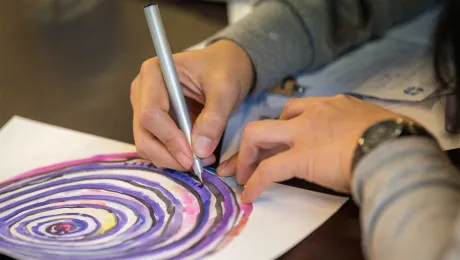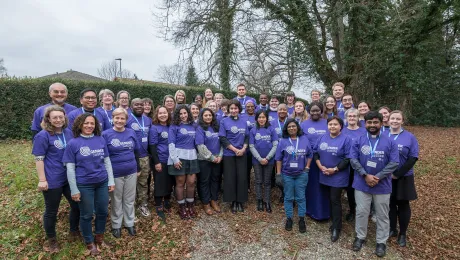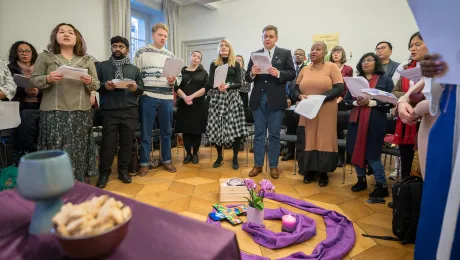The ‘double-edged sword’ of digital technology: find out how Lutheran leaders in the struggle for gender equality are harnessing mobile and other technologies to empower, connect and protect women and girls from violence or discrimination.
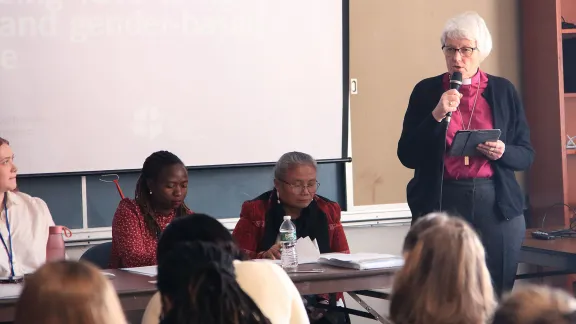
Prof. Antje Jackelén, Archbishop Emerita of the Church of Sweden, speaking at the LWF event on harnessing technology to end gender-based violence. All Photos: Roy Anthony Morrison
LWF delegates from all regions highlight ways of harnessing digital innovations to protect women and girls
(LWI) - Digital technologies are “a double-edged sword” in the battle against gender-based violence. On the one hand they can empower, protect and connect women and girls in the remotest corners of the globe. On the other, they have unleashed new and insidious ways of targeting women and seeking to silence their voices.
Those were the words of Prof. Antje Jackelén, former archbishop of the Church of Sweden, who joined delegates from the Lutheran World Federation (LWF) for an event at the 67th session of the UN’s Commission on the Status of Women (CSW). In 2021, Jackelén, who serves as LWF’s vice president for the Nordic region, was herself the target of online threats and hate speech, forcing her to suspend her Twitter account for some time.
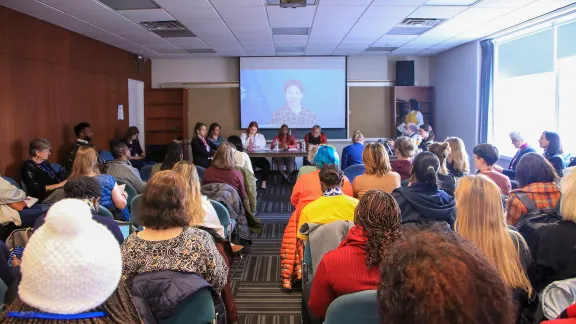
Participants at the CSW67 event listen to LWF General Secretary, Rev. Dr Anne Burghardt. highlighting the need to harness technology to end gender-based violence.
The 10 March event, entitled ‘Harnessing information and digital technology to fight gender-based violence’, brought together Lutheran leaders from Africa, Asia, Europe and Latin America, who are on the frontlines of the struggle for gender equality and women’s empowerment in their local churches and national or regional contexts.
LWF General Secretary Rev. Dr Anne Burghardt opened the discussion by recalling that “at least one out of every three women worldwide will experience gender-based violence at least once in [her] lifetime,” making it “one of the greatest violations of women and girl’s human rights.” That’s why protection against these new forms of online violence and harassment “must be at the core of agreements coming out of this year’s CSW” which is dedicated to innovation, technological change and education.
Protection against online violence and harassment “must be at the core of agreements coming out of this year’s CSW.”
– LWF General Secretary Rev. Dr Anne Burghardt
Digital innovation, the LWF leader continued, must be especially mindful of the “dire” situation of many women and girls in the global south, who have severely limited access to technology, as the COVID-19 pandemic laid bare. “When education shifted to online platforms,” Burghardt observed, “millions of girls were left behind.” At the same time, she insisted, technological progress must be mindful of the climate crisis and “learn from indigenous knowledge” to become more sustainable and “end the reckless extraction of natural resources.”
Panelist Miriam Alum, a social protection advisor for LWF Uganda, shared examples of her work with refugee women and children from South Sudan, Rwanda, Burundi and the Democratic Republic of Congo. While her country has received global recognition for its reception of refugees, she said many women and girls “have been left behind” and fail to complete secondary school education. Costs of schooling, poor internet connectivity and high rates of teenage pregnancy all contribute to dropout for girls.
On the positive side, she noted how technology has facilitated more efficient cash transfers via mobile phones, free helplines for survivors of violence and a geographic information system, set up by the UN High Commissioner for Refugees. This has enabled the mapping of vulnerable women’s locations and the provision of timely services, such as ambulances to take pregnant women to hospital or professional support for those facing domestic violence and abuse.
Tackling stereotypes and patriarchal norms
Similar challenges and opportunities were described by Ameera Khamees, director of LWF Jordan, who also works with Palestinian, Syrian and Iraqi refugees. Statistics show that 89 percent of households own at least one mobile phone and the internet reach in her county is around 90 percent. Numbers of female graduates in science, technology, engineering and mathematics (STEM) are significantly higher than men, yet she pointed to a “striking gap for women between education and employment.”
The lack of employment opportunities for women in what are traditionally seen as “men’s jobs” is "always about stereotypes and patriarchal norms,” Khamees said. To counter these attitudes, LWF has piloted an ‘innovation lab’ for teenagers, encouraging both girls and boys to find digital solutions to problems that people in their communities are facing, such as software to support those with disabilities. Older women are also supported with business skills training, while younger children are offered workshops where they (and their parents) can learn about the responsible use of internet and social media.
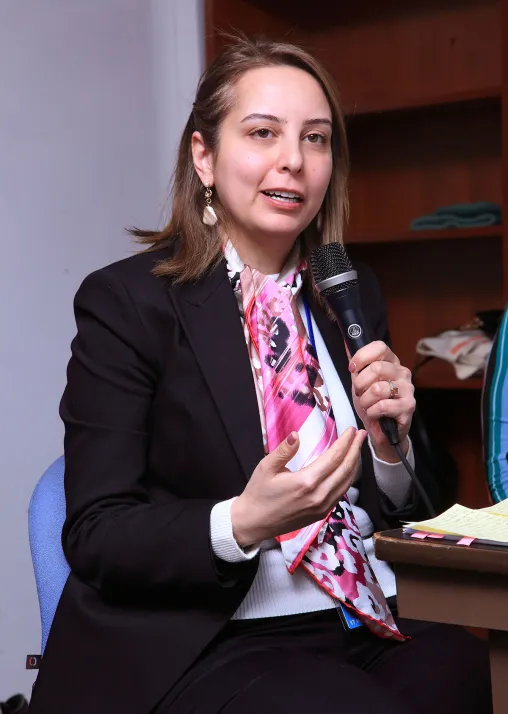
Ameera Khamees, Country Director for LWF Jordan speaking at the CSW67 event
In Latin America, LWF Colombia is working with indigenous and Afro-Caribbean women in the conflict-ridden Chocó region, which has among the highest levels of poverty and the lowest rates of healthcare and education in the country. Laura Chacón Gonzales, communications and advocacy coordinator in Colombia and Venezuela, described how LWF, supported by UN Women, works closely with local authorities to provide mobiles phones and data to the most vulnerable women, enabling them to access shelters, support services and specialized police officers.
In Indonesia, Rev. Debora Sinaga was the first female superintendent of her Batak Protestant Christian Church, based in North Sumatra, and currently serves as head of its Diaconia Department. As one of the largest Protestant churches in the region with four and a half million members, she said women in leadership remain a minority, with most facing discrimination and exclusion from decision making processes. While women are the majority of internet users in Indonesia, she noted that, without training, they are increasingly vulnerable to online violence and cybercrimes.
Yet women in her church are also working to overturn the obstacles, setting up gender justice programs in every region, as well as a national women’s conference and a crisis center to provide survivors of violence and trafficking with legal, medical, psychological, spiritual support. and income-generating activities. The pandemic also saw more women turning to new technologies to share their stories, to expand support networks, to learn new skills and to market their produce and other goods online.
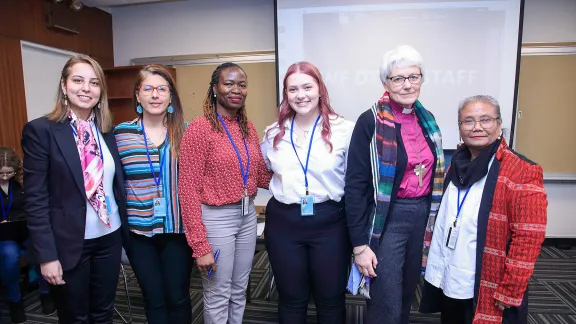
Panelists Laura Chacón Gonzales, Miriam Alum, Ameera Khamees and Rev. Deborah Sinaga with moderator Kayla Zopfi, an ELCA Hunger Advocacy Fellow, at the CSW67 event on harnessing technology to combat gender-based violence.
Elsewhere in the Asia region, Dr Bijaya Bajracharya, Country Director of LWF Nepal shared similar stories of partnering with the ‘Geokrishi’ digital platform to offer new agricultural skills to over 150.000 women. Women in the northern Kailali district have learned new irrigation and weeding techniques, enabling some of them to double their maize production. By photographing a diseased plant, they can also receive expert advice, which includes a voice function for those unable to read or write. But Bajracharya added that empowerment of women in socio-economically disadvantaged communities remains a challenge, with many lacking access to a mobile phone.
The Baghdad Women’s Association, which partners with LWF, also brought examples of using technology to expand services for survivors of gender-based violence. LWF was the first to support the association’s work with minorities, including Yazidi women who fled to the Qaraqosh region to escape violence and conflict. Networking through social media plays a vital role in encouraging survivors to contact one of the association’s centers around the country.
Wrapping up the panel discussion, Rev. Bafana Khumalo, co-founder of the South Africa-based Sonke Gender Justice network urged participants to continue standing up for the rights of the most marginalized women to have access to life-saving information and communication technology. “God, who sees and shares the pain and marginalization is calling us all, not just to make statements, but to act and partner with others to make a real difference to the lives of rural women,” he concluded.
